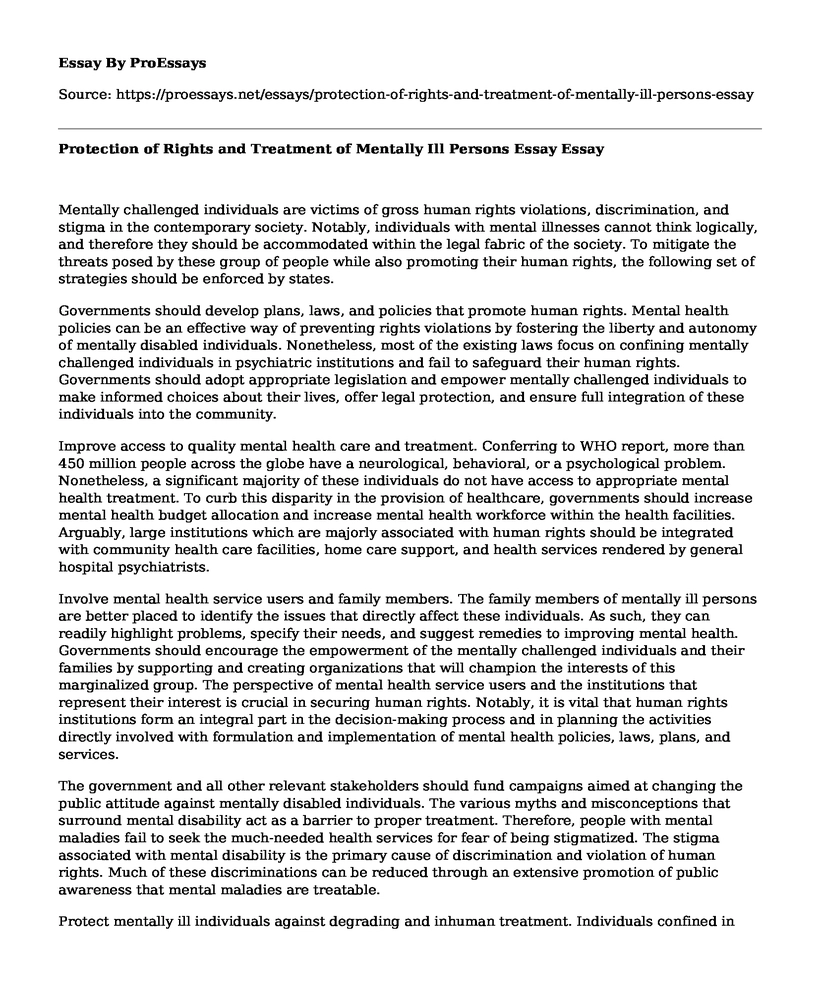Mentally challenged individuals are victims of gross human rights violations, discrimination, and stigma in the contemporary society. Notably, individuals with mental illnesses cannot think logically, and therefore they should be accommodated within the legal fabric of the society. To mitigate the threats posed by these group of people while also promoting their human rights, the following set of strategies should be enforced by states.
Governments should develop plans, laws, and policies that promote human rights. Mental health policies can be an effective way of preventing rights violations by fostering the liberty and autonomy of mentally disabled individuals. Nonetheless, most of the existing laws focus on confining mentally challenged individuals in psychiatric institutions and fail to safeguard their human rights. Governments should adopt appropriate legislation and empower mentally challenged individuals to make informed choices about their lives, offer legal protection, and ensure full integration of these individuals into the community.
Improve access to quality mental health care and treatment. Conferring to WHO report, more than 450 million people across the globe have a neurological, behavioral, or a psychological problem. Nonetheless, a significant majority of these individuals do not have access to appropriate mental health treatment. To curb this disparity in the provision of healthcare, governments should increase mental health budget allocation and increase mental health workforce within the health facilities. Arguably, large institutions which are majorly associated with human rights should be integrated with community health care facilities, home care support, and health services rendered by general hospital psychiatrists.
Involve mental health service users and family members. The family members of mentally ill persons are better placed to identify the issues that directly affect these individuals. As such, they can readily highlight problems, specify their needs, and suggest remedies to improving mental health. Governments should encourage the empowerment of the mentally challenged individuals and their families by supporting and creating organizations that will champion the interests of this marginalized group. The perspective of mental health service users and the institutions that represent their interest is crucial in securing human rights. Notably, it is vital that human rights institutions form an integral part in the decision-making process and in planning the activities directly involved with formulation and implementation of mental health policies, laws, plans, and services.
The government and all other relevant stakeholders should fund campaigns aimed at changing the public attitude against mentally disabled individuals. The various myths and misconceptions that surround mental disability act as a barrier to proper treatment. Therefore, people with mental maladies fail to seek the much-needed health services for fear of being stigmatized. The stigma associated with mental disability is the primary cause of discrimination and violation of human rights. Much of these discriminations can be reduced through an extensive promotion of public awareness that mental maladies are treatable.
Protect mentally ill individuals against degrading and inhuman treatment. Individuals confined in mental health facilities are often exposed to the inhuman and degrading treatment. They are sometimes put in seclusion or on restraints for an extended period. Moreover, they are mostly over-medicated to keep them docile and manageable. To curb this, governments should implement mental health laws and policies that prevent violation and discrimination of these individuals. Moreover, free and informed consent should form the basis for rehabilitation and treatment of mentally ill individuals. Finally, the improper use of restraints and seclusion should be outlawed, and legal mechanisms and monitoring agencies should be established to guard against mistreatment of these marginalized group in the society.
Cite this page
Protection of Rights and Treatment of Mentally Ill Persons Essay. (2022, May 09). Retrieved from https://proessays.net/essays/protection-of-rights-and-treatment-of-mentally-ill-persons-essay
If you are the original author of this essay and no longer wish to have it published on the ProEssays website, please click below to request its removal:
- Essay Sample on Palestinian Women Suicide Bombers
- Essay Sample on Prevalence of the Mental Disorders Faced By Refugee Children
- Literary Analysis Essay on Shakespeare's Hamlet
- Building Self-Esteem in Young Adolescents: A Crucial Internal Asset - Essay Sample
- GDP Decline: US Aging Population to Increase 39% by 2050 - Essay Sample
- Essay Example on Psychological Disorders: A Gradual Process of Change and Effects
- Essay Sample on Living By Values: Improving My Social & Working Life







